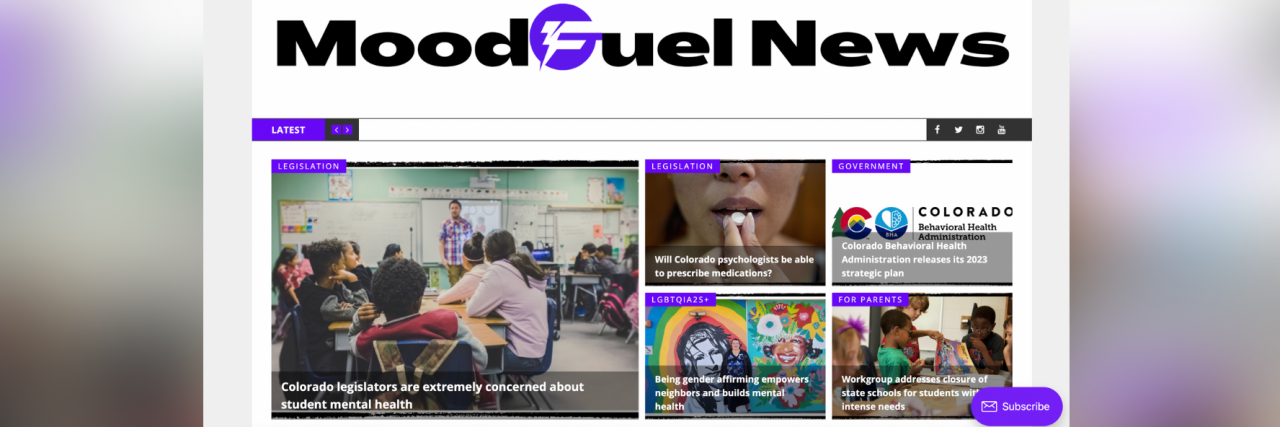Renata Hill has generated a whole lot of impact in her journalism career. And we mean a lot.
She has worked as a tech writer, Associated Press elections reporter, and social justice journalist. Hill is also active in the Association of Health Care Journalists, the Native American Journalists Association, and the National Association of Peer Supporters.
But her latest accomplishment — launching Moodfuel News, a nonprofit publication dedicated to solutions-based, community-centered mental health journalism — is poised to be her most impactful project yet.
Inspired by the shockingly poor mental health statistics within her home state (Colorado, ranked last in the United States in adult access to mental health care), Hill was driven to take action. As she’s done throughout her career, she got right to work, putting her skills toward advancing the public good. She developed a publication that would focus on expanding access to care through inclusive, solutions-based journalism and resources.
Moodfuel News went live just a few months ago, in October 2022. It is supported by organizations such as Google News Initiative, the Lenfest Institute for Journalism, LION Publishers, and the News Product Alliance as well as individual supporters in Hill’s community.
The Mighty recently caught up with Hill via email to learn more about Moodfuel News and see how Hill’s efforts to support this underserved community are progressing (spoiler: quite well!):

You’ve mentioned that supporting people in recovery from trauma and suicidal intensity is your Why. Was there a single inciting moment you can remember when you decided “I’m going to start something of my own to address this?” If so, what can you tell me about that moment?
Yes, that moment was when I learned that Colorado ranks LAST in access to mental health care (per Mental Health America) and 6th in suicides (per CDC). I was completely shocked because as a long-time resident, I’d always considered and listened to the marketing about Colorado being the “healthy living state.”
Well, that may be true for some residents, but there’s a different reality for many others behind that breezy perception. Almost 1.8 million Coloradans self-reported mental health needs in 2021 and I think that number will increase as the effects of the pandemic reverberate, the cost of living increases and people continue to feel isolated.
It can be a really scary leap to start your own organization. How did you give yourself that extra push to actualize this dream?
I am extremely grateful because my spouse is very supportive and I was honored to participate in several national news entrepreneurship and journalism support programs.
However, my biggest motivation is knowing what it’s like to be in that dark, painful, lonely space where living is only one option. No one should be in that place and knowing that there are residents, neighbors who are suffering, it drives me.
How have you balanced your own mental health while tackling this wonderful and ambitious (and no doubt highly consuming) task of launching MoodFuel?
I was just speaking to a colleague about learning to walk my talk on self-care. As a solopreneur wearing all the hats of business operations, marketing, fundraising, editorial, etc. with only 24 hours each day, it’s been overwhelming, but also soul-lifting because I know I’m making a difference.
Still, practically, to care for others, I need to care for myself, so I’m learning. I integrate short breaks into my schedule every couple of hours that include getting away from my desk and stretching, a walk during the day with my donkey, eating a healthy breakfast and lunch, and focusing on my family and other sources of wellness, activity, and entertainment during the weekends really helps.
I just returned from a hiatus in January in which I didn’t publish the newsletter and only a couple of new pieces on the website because I allowed myself that breathing room. It’s very important to practice self-care in realistic, attainable ways by starting small and building.
Why do you believe your state of Colorado was able to get to this dubious distinction of being ranked last in mental health care?
I’ve spent a LOT of time pondering that very question and posing it to mental health organizations, grassroots advocates, providers, government agency officials, and, most importantly, residents.
Of course, there were many different answers, but my takeaway is that the focus of mental health experts and state legislators was elsewhere for along time, meanwhile the state’s mental health “safety net” of state-funded community clinics deteriorated and the whole time regular folks were afraid to speak out because they didn’t want negative labels at home, at work or in their neighborhoods.
Then, COVID exacerbated all the problems non-wealthy residents face in trying to access mental health care, such as being uninsured or under-insured, not being able to find and/or afford child- or eldercare, working several jobs with a schedule that doesn’t allow for self-care, lack of transportation, and other challenges.
Also, as Dr. Medlock, our new Behavioral Health Administration Commissioner, would tell you, the dearth of mental health care providers at every level has created another huge access challenge. There just aren’t enough peer specialists, therapists, psychologists, psychiatrists, and other providers to support the numbers of adults and youth seeking care.
Now, with the new BHA and constituents putting legislators in the hot seat, the tide may be changing. Hopefully.
What’s the biggest challenge preventing others from starting similar resources for other states and/or countries?
Interestingly, mental health journalism is a growing field. More legacy newspapers in the U.S. are hiring journalists for mental health reporting and more small, independent mental health newsrooms, like Moodfuel News, are appearing around the world.
A colleague in India, Tanmoy Goswami, launched Sanity in 2020 after he lost his regular reporting job and the response to his work has been immense, not just in India but from dozens of other countries! That’s not a fluke; I have readers in Malaysia and Australia as well as many U.S. states.
People are so hungry for inclusive, solutions-based information and even more so for a sense of community — to know that others live with the same mental challenges, that they aren’t alone — it’s a relief, but also galvanizes people to speak out and seek out support. Peers with lived experience want — need — to communicate with each other.
What has the response been like since your launch last year?
Very positive. Since I launched in October, people continue to tell me how much they appreciate the work, how it’s helped them or a loved one find resources, how they feel better knowing that people are actually talking about mental health holistically — mental health is health.
Stigma is still omnipresent, but it’s not as omnipotent as it was. At Moodfuel News, in addition to info on legislation and policies, we focus on Changemakers, who smoothe the way toward easier access, and Thrivers, who were down, but learned healthy ways of coping and now serve as role models for others who are struggling.
The whole process, all the people I meet and listen to have been so inspirational and energizing!
How did you land on the name MoodFuel?
Ha, it’s kind of a long story, but the short version is I started with another title then changed it because I wanted a word that inspired action and hope. Anyone with mental health challenges (which is just about everyone) is dealing with difficult moods, and we all need to be empowered — or fueled — by support to recover or feel better. We are fueling better moods and mental health.
If you could snap your fingers and accomplish just one thing with MoodFuel in the next year, what would you choose?
Reach everyone who is struggling, despairing, frustrated, fearful, and let them know that mental health is achievable because support is available.
Absurd question time: If I gave you airtime at the next Super Bowl to tell the entire nation one thing worth keeping in mind about mental health, what would that be?
That’s not absurd — it’s awesome! Dream BIG, right?
My message would be, “YOU are worthy of support in the way you need when you need it. Reach out because people see you and are ready to be there for you.”
Is there anything else about MoodFuel you think our audience would want to know about?
After this great interview, I hope people will tell me what they need, what mental health news would benefit them and how they want to receive it. I want to do more and better.
Subscriptions are free, so sign up at www.Moodfuel.org

